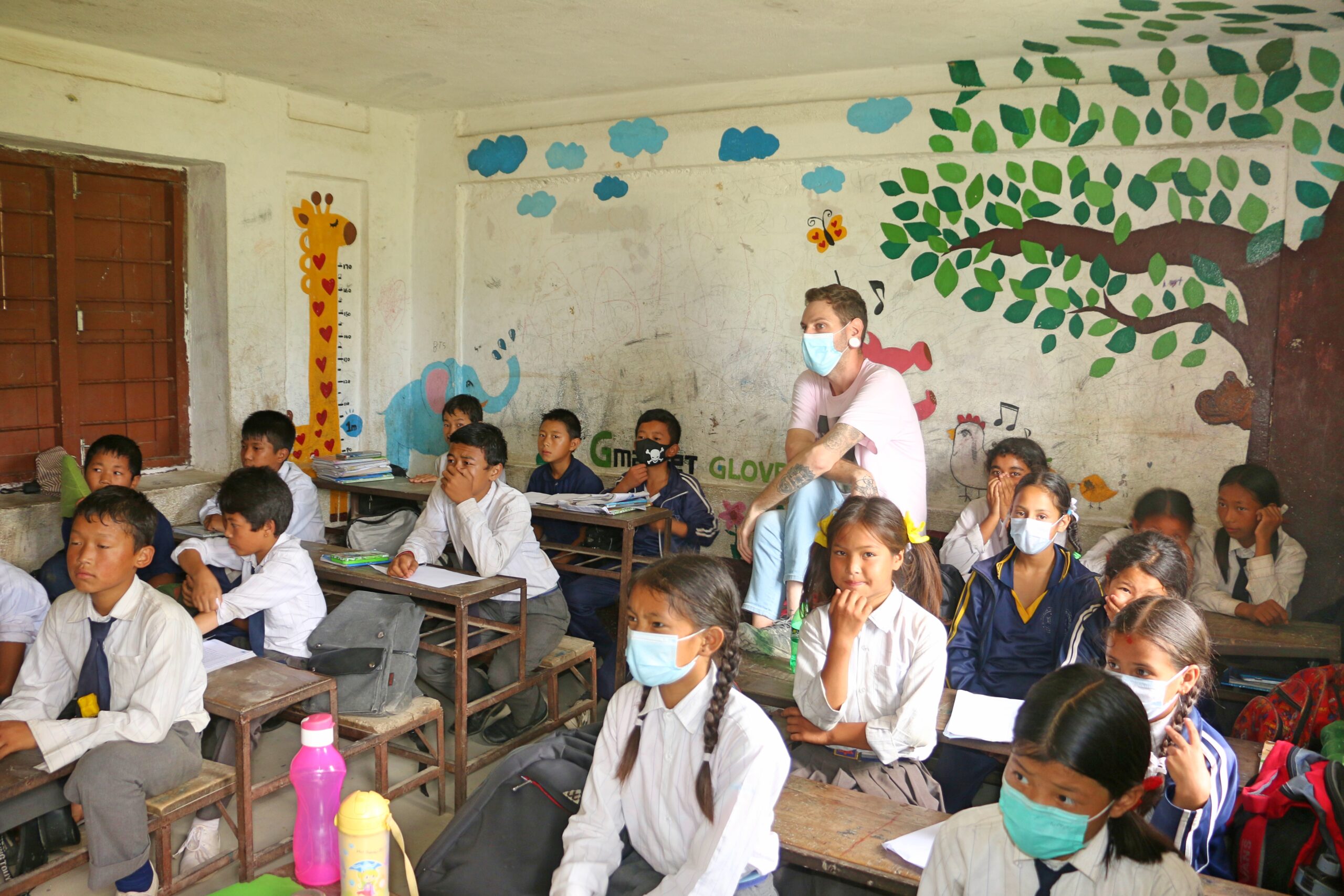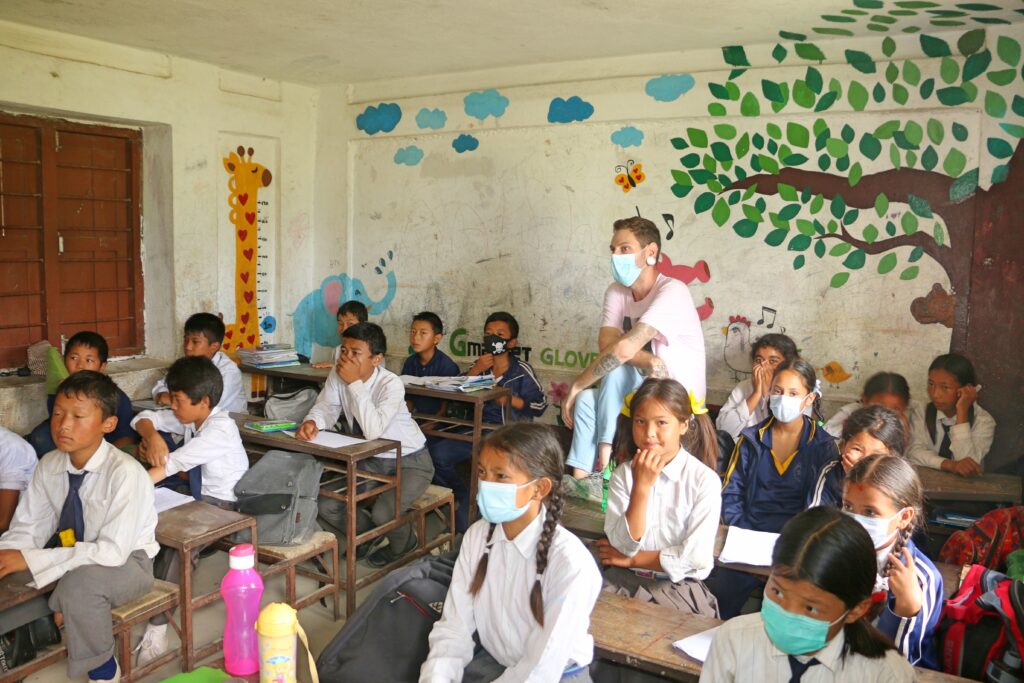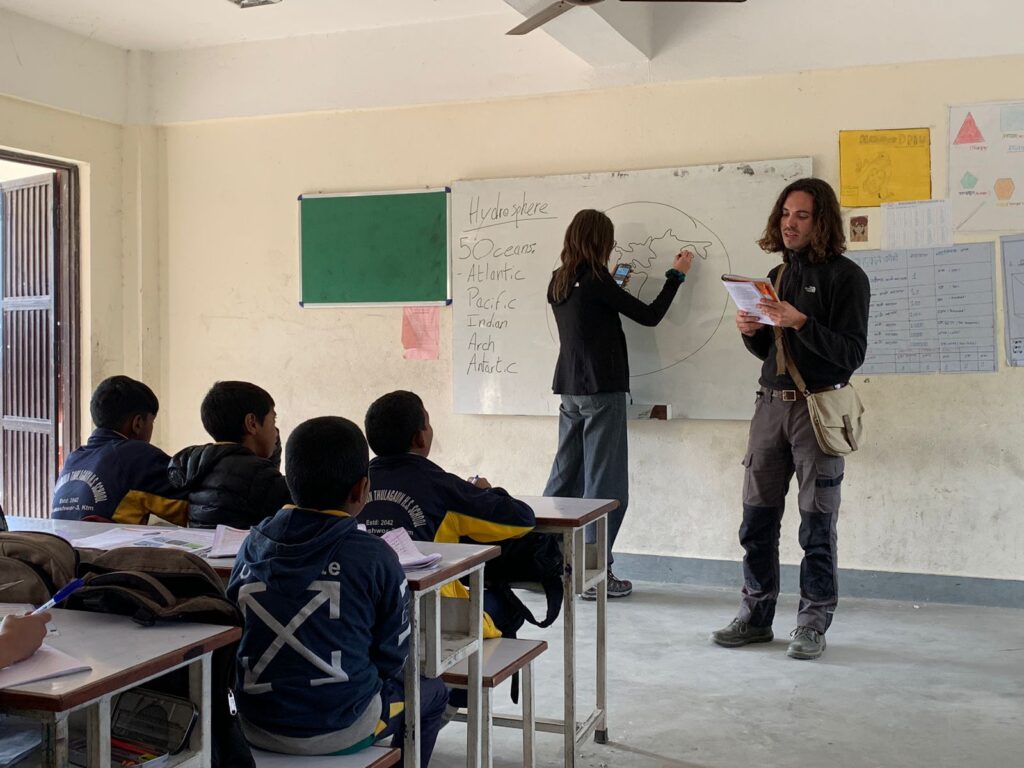Project Overview
Teaching English Volunteer Programs Nepal: Empower Minds and Enrich Communities
| 📍 | Location | Outskirts of Kathmandu & Okhaldhunga |
| 📅 | Start Dates | Every 1st & 3rd Monday |
| ⏳ | Duration | 2 weeks to 10 months |
| ⏰ | Working Hours | 3-6 hrs/day, 5 days/week |
| 🏡 | Accommodation & Food | Stay with a host family or at a volunteer hostel |
| 👥 | Eligibility | Open to volunteers 18+, families, couples, & groups |
| 🛡️ | Safety & Support | 24/7 assistance & secure placements |
| 🎓 | Orientation | 2-3 days on arrival training |
| 🌏 | Weekend Travel | Explore festivals, temples, Himalayas, & immerse in culture |
| 💰 | Fees | Transparent; covers essentials.Click here to learn more |

Teaching English Volunteer Programs Nepal: Empower Minds and Enrich Communities
Have you ever dreamed of Teaching English Volunteer Programs in Nepal that blend cultural immersion with meaningful service? Would you like to volunteer to teach English in Nepal, guiding eager students who aspire to improve their career prospects and enhance global communication? Our project, Inspire Nepal: Teaching English Volunteer Programs, answers these calls. Whether you wish to teach English in Nepal part-time or immerse yourself in a month-long adventure, your presence strengthens local education systems. Children thrive under new teaching methods while you build cross-cultural friendships and explore the breathtaking wonders of the Himalayas.
Project Description
Introduction
“Inspire Nepal: Teaching English Volunteer Programs” is an innovative approach to uplifting academic standards and prospects nationwide. Local schools see an infusion of imaginative teaching styles by harnessing volunteers’ English fluency and specialized training. Class discussions become more interactive, while advanced materials—like worksheets, reading stories, or phonics drills—enrich the curriculum. For you, immersion in Volunteer Teaching Programs Nepal fosters personal growth, cross-cultural empathy, and tangible results that shape children’s confidence in spoken and written English.
Background
Though English is taught in Nepali schools, many educators cope with large class sizes, minimal resources, and a legacy of rote memorization. According to the Nepal Ministry of Education, around 35% of rural students struggle with basic English comprehension, limiting academic success and job readiness. Meanwhile, urban youths face intense competition for scarce professional roles. Our Volunteer English Teacher Nepal projects combat these hurdles by introducing dynamic lesson plans, small-group tutoring, or one-on-one conversation practice. Over time, these local partnerships stimulate a culture of active language learning, directly elevating children’s communicative abilities and academic outcomes.
Key Objectives
- Boost English Literacy
Provide interactive lessons for vocabulary, grammar, and speaking fluency, bridging reading/writing deficits identified in local curricula. - Enhance Classroom Experience
Integrate fun teaching methods—group debates, role-playing, collaborative tasks—that depart from rote memorization, engaging both the teacher and the learner. - Empower Educators
Support local teachers by co-planning lessons, modeling advanced teaching strategies, sharing updated resources, creating sustainable improvements. - Community Outreach
Organize mini-seminars for parents or guardians, unveiling the value of consistent English practice at home and bridging Nepal ESL volunteer programs with daily family life.

Why Volunteer for This Project?
The Need
Nepal’s educational progress is hindered by uneven resource distribution. Overpopulated classrooms, especially in government schools, restrict individualized feedback. Meanwhile, tourism in Nepal remains robust, fueling demand for English proficiency. A 2021 UNESCO study found that youths with better English skills see 25% higher employment rates in tourism-based roles. Engaging in Volunteer Teaching English in Nepal or Teach English Abroad Nepal addresses skill deficits, enabling students to seize new opportunities.
Global Relevance
English is a global lingua franca, empowering those who speak it with broader academic, professional, and cultural avenues. Volunteers in English Teaching Volunteer Nepal roles bolster the United Nations’ Sustainable Development Goals (SDG 4: Quality Education), bridging linguistic gaps that hamper international collaboration. Moreover, forging ties between volunteers and local schools fosters cultural exchange that transcends borders.

Volunteers’ Roles and Responsibilities
Below are 10 essential tasks related to teaching English volunteer programs in Nepal. We incorporate secondary and LSI keywords into these responsibilities:
- Lesson Planning: Prepare interactive lessons on grammar, reading comprehension, or speaking. Align with local curricula but incorporate creative TEFL volunteer Nepal approaches.
- Small-Group Tutoring: Offer specialized guidance for struggling students or high achievers, bridging the synergy of Nepal ESL volunteer programs.
- Classroom Assistance: Work with local instructors, explaining language nuances, demonstrating correct pronunciation, or assisting with big classes.
- Conversation Clubs: Host weekly conversation sessions focusing on everyday topics or cultural comparisons, bridging community, and teaching volunteer Nepal aims.
- Homework Help: Provide after-school tutoring for youths or coordinate with after-school program volunteering abroad frameworks, ensuring children keep pace with official syllabi.
- Resource Creation: Design flashcards, reading materials, or digital slides, leaving behind tangible learning tools for local staff.
- Extracurricular Workshops: Conduct short modules on writing essays, journaling, or creative story writing, enriching the standard curriculum’s scope.
- Teacher Training: For experienced volunteers, share teaching techniques—like role-playing or singing—with local educators. This fosters sustainability beyond volunteer presence.
- Community Sessions: For parents or guardians, run short English orientations or “English at Home” tips to reinforce the child’s progress.
- Document & Evaluate: Track improvements, gather student feedback, and refine future lessons or volunteer resource suggestions.
Daily Activities
Sample Schedule:
- 08:30 – 09:15: Breakfast at your volunteer house or homestay.
- 09:15 – 10:00: Commute or walk to the assigned school.
- 10:00 – 13:00: Morning classes, co-teaching, or small-group reading drills.
- 13:00 – 14:00: Lunch break, typically Nepali dal bhat.
- 14:00 – 16:00: Organize conversation clubs, after-school tutoring, or teacher support.
- 16:00 – 17:00: Return to lodging, record daily reflections, and plan the next day’s lessons.
- 17:00 – 18:00: Cultural immersion or free time for personal exploration.
Special Projects
- Language Exchange Clubs: If volunteering for an extended period, create English clubs that teach volunteers basic Nepali, fostering mutual understanding.
- School Library Revamp: For volunteers skilled in library science or organization, help set up reading corners, coordinate competitions, or gather donated books.

Skills and Requirements
Required Skills
- Fluency in English: Confidence in grammar and conversation helps you guide local students.
- Communication & Patience: Ability to clarify complex grammar points or manage varied language levels.
- Adaptability: Resource limitations or large class sizes demand creativity in delivering lessons.
Eligibility
- Age: Typically 18+ (16+ with adult guidance, subject to staff approval).
- Time Commitment: At least two weeks is recommended; extended stays yield deeper relationships and more consistent outcomes.
- Documentation: Valid passport, recommended travel insurance, correct volunteer visa for Nepal.
Preferred Skills
- TEFL Volunteer Nepal Credentials: TEFL or TESOL background can be beneficial, though not mandatory.
- Teaching or Tutoring Experience: Basic classroom or ESL exposure helps you adapt quickly to local conditions.
- Cultural Sensitivity: Ready to respect local norms, from dress codes to classroom etiquette, fosters a positive environment.
Cultural Experience
Cultural Immersion
Volunteering in Teach English Abroad Nepal is more than classroom interactions. It’s about exploring:
- Nepali Festivals: Tihar, Dashain, or other communal events full of dancing, blessings, and shared feasts.
- Local Cuisine: Savor dal bhat, roti, and fresh vegetable curries. Volunteers often share meal prep with host families or housemates.
- Language Learning: Master essential Nepali phrases (e.g., “Namaste,” “Dhanyabad,” etc.) that delight children and staff and bridge cultural connections.
Language Learning
- Basic Nepali: Encouraged for deeper relationships. Meanwhile, older kids or bilingual teachers assist with translations.
- Everyday Interaction: You naturally glean new words from caretaker dialogues or student chatter, smoothing lessons over time.
Logistics and Support
Accommodation
- Volunteer House: Shared dorm-like spaces, communal kitchens, and a setting to bond with co-volunteers from around the globe.
- Homestay: More immersive, typically a private or shared room with a Nepali family, forging personal ties and daily language practice.
Meals
- Nepali Standard: Typically, two or three meals are served daily, featuring rice, lentils, vegetable curries, and occasional meat.
- Dietary Preferences: Vegetarian or other needs can be managed if you inform us beforehand.
Transportation
- Airport Pickup: Expect a warm greeting from local staff at Kathmandu’s Tribhuvan International Airport.
- Commute: Buses, shared taxis, or short walks to your designated school or youth center.
On-Site Support
- Coordinators: Offer orientation, handle scheduling, assist in bridging cultural norms, and remain available for emergencies or clarifications.
- Local Teachers: Provide existing materials, highlight class objectives, and align volunteer tasks with official curricula.
Health and Safety
- Vaccinations: Consult your doctor about Typhoid, Tetanus, Hepatitis, or Japanese Encephalitis.
- Insurance: Travel insurance is essential for medical coverage or trip disruptions.
- Emergency Protocol: Our staff maintains direct lines to clinics or local authorities, ensuring swift responses in urgent situations.
Program Fees and Inclusions
For detailed fees, see our Program Fees page. Generally covers:
- Accommodation (volunteer house or homestay)
- Meals (Nepali staples twice or thrice a day)
- Local Staff Coordination (orientation, translations, day-to-day scheduling)
- Basic Teaching Supplies (limited items, but volunteers often bring or source additional materials)
Impact and Outcomes
Volunteer Impact
- Personal Growth: Develop leadership, classroom management, and cross-cultural empathy—valuable for professional or academic pursuits.
- Resume Enhancement: Your volunteer English teacher stint stands out for aspiring teachers or NGOs, highlighting your global service experience.
- Emotional Fulfillment: Seeing children overcome language barriers or master new vocabulary fosters personal joy and lasting friendships.
Community Impact
- Tangible Language Gains: Students become more fluent, confident, and likely to pass English-based exams crucial for higher education or tourism roles.
- Teacher Support: Overburdened local educators gain fresh methods, partial relief from extensive class management, and new interactive materials or lesson ideas.
- Long-Term Cultural Exchange: By bridging your world with local communities, you ignite transformations in worldview, fostering mutual respect and ongoing connections.
Statistic: A 2022 UNESCO study in Nepal found that student reading levels jumped by 20% when they received at least two hours per week of focused English tutoring from volunteer teachers.
Success Stories and Testimonials
Volunteer Experiences

Lily

James’s
Local Impact Stories

Parents

Prakash
Application Process
Ready to empower young minds through “Inspire Nepal: Teaching English Volunteer Programs”? Follow these steps:
- Complete the Online Application: Share your interests, skill sets, and availability at VolunteeringNepal.org/apply-now.
- Submit Your Resume: Provide your CV plus two references (professional or academic).
- Await Confirmation: Our staff will email acceptance details and orientation resources.
- Pay the Booking Fee: Secure your volunteer role with a €150 deposit.
- Receive the Pre-Departure Pack: Access cultural and educational guidelines, recommended immunizations, and teaching tips.
- Final Payment: Provide the remaining program fees upon arrival or via wire transfer.
FAQ's
- No, but a TEFL or TESOL background helps. Enthusiasm and strong English fluency suffice; local staff or orientation assist novices.
It is generally safe. Our staff handles accommodations, local advice, and emergency protocols. Common sense and cultural respect ensure a positive, secure experience.
Potentially, yes. If your schedule allows, we can coordinate you across different sites—like a primary school morning session plus an after-school reading club.
Many children know basic English, especially in older grades. Where needed, bilingual teachers or older students interpret.
Two weeks can yield positive outcomes, though longer stints deepen trust and consistent progress. We adapt tasks to each volunteer’s time constraints.
Typically, volunteers must be 18+. Some minors (16–17) can participate with parental permission. Families, too, if they manage logistics, are welcome.
Join Us Today to Make a Difference!
Nepal’s children deserve dynamic lessons, personalized coaching, and global inspiration. Your willingness to volunteer to teach English in Nepal can fuel hope, broaden horizons, and shape entire villages. Whether you’re an aspiring teacher or a caring individual with strong English skills, these Teaching English Volunteer Programs Nepal stand ready for your energy and creativity.
- Volunteer: Deliver daily language classes, reading sessions, or conversation clubs, bridging skill gaps in grammar or speaking.
- Intern: Combine your academic or professional path with hands-on ESL engagement, forging deeper cultural and teaching experiences.
- Donate: If onsite volunteering isn’t feasible, sponsor school libraries, supply reading materials, or help expand digital teaching resources.
- Share: Motivate friends, families, or social media groups to join or fund educational expansions.
Now is your chance to teach English abroad in Nepal, bolstering local learners, forging personal growth, and experiencing the majesty of Himalayan culture. Apply now or email support@vin.org.np to embark on a fulfilling educational adventure that reshapes child outcomes and touches countless lives.
